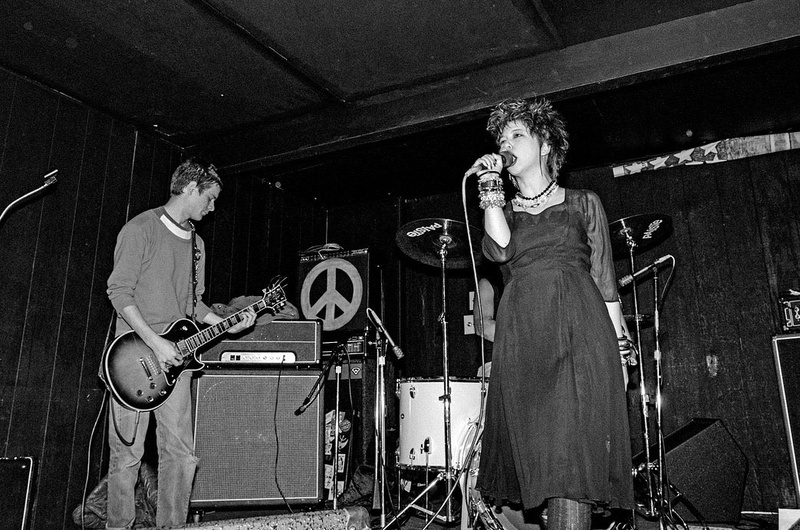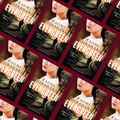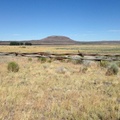LIFE AFTER PUNK ROCK
Tamiko Nimura (TN): So well this is a good chance, I think, to ask about the groups that have come along later like Sleater-Kinney, like Bikini Kill, like the Linda Lindas….I just wanted to know your take on them and just hear how you must feel to see them on the rise.
Karen Maeda Allman (KMA): I thought it was really exciting and anyway I guess I should've known it's inevitable…But I guess nothing’s inevitable, but I just loved it. I loved Bikini Kill, I loved things that Kathleen Hanna did after that, I thought she was really smart and I loved how political it was. I didn't love, you know, the whiteness, but that there was a response to that, as one would hope. I found out that Toby Vale was a Conflict fan, so that was really cool.
I love the Linda Lindas. I just thought that was great. I ran out and bought their T-shirt, and listened to the music. And they play so much better than we did! It's exciting to me that girls are doing that.
I'm really into the Eurovision song contest and so… Do you know about the Eurovision song contest? And yes, so many Asians. Filipinos! A Filipina woman won. And my favorite YouTube channel is run by a guy whose mom was Vietnamese and dad was white, he's from Georgia and he lives in, he's queer, he lives in London ,and covers Eurovision, and we always know who the all the Asians are. A Filipino Australian guy this year looks like he's poised to do really well.
So it's been interesting to see kind of the diaspora related to Eurovision kind of showing it's opened the musical forms and who sings, and what wins, ever doesn't win and but yeah I still listen to all kinds of music. But I really particularly love the combination of punk, hip-hop, and folk music that is often on display on Eurovision.
One of the songs, that song for Ukraine this year, I think it's amazing, it's called Stephania named after this guy's mother. And it has folk music and also some rap in it, and it's both about his mother and maybe now being embraced, just like an anthem about motherland and so…. I think that music can really inspire people, it can make you feel like you have company even when I was thinking, “oh my God where are the other queer punks, you know?” I don't see them.
Sometimes they would write to me, Donna Dresch from Team Dresch wrote to me when she was still doing zines and before she became famous. And we write back and forth about our lives, and then there was homocore [a music genre that is an offshoot of punk rock] after that and she introduced me to homocore.
Sometimes I like the sentiment but not the musical forms, sometimes I like the musical form but probably better not to listen to the lyrics! But I'm just amazed by people’s creativity and also the way that music can help connect us and I feel like I'm connected to other generations of people both in a sentimental way, but also in a real way.
I mean, what's your connection to music? I mean are you connected at all to punk music or what, I don't know that part of you, I just know you as the amazing writer and historian…
TN: Thanks, yeah, my husband and I have been together basically since high school.
KMA: Wow I was like, “that many years, oh my God, ‘how old is Tamiko?’”
TN: I am almost 50. and I'll be 49 this December, and my husband and I met in the marching band, I was in the color guard… And he was a drum major after I graduated, but I’d always loved music. I grew up with a dad who loved music, loved records, and probably wanted to be in musicals but you know being an Asian guy, was not afforded that opportunity super often. I grew up with listening to records. He had a wall, literally a wall, and some students at the college where he was working built him a tansu, specifically for his record collection.
KMA: That’s amazing. You know, one thing I didn't mention which is that kind of the middle of this [punk] period I went to Japan where there was a burgeoning punk scene in Japan. I couldn't go to [any concerts], because I was with my mother. And I went to this record store and I saw this guy who looked kinda punky and he was looking through records.
So I was like, “can you help me find some punk music?” and he was like, “I don't speak English.” I was like, “that's fine. can you help me find punk music?” and I did!
So yeah and then later there were Shonen Knife and you know other bands. Did you ever see any of these bands or when I came here?
TN: No, I didn’t, but yeah, Shonen Knife is awesome.
NURSING, BOOKSELLTING, MUSIC, EMPATHY
KMA: I came out here for a doctoral program and never finished. I was trying to write about multiracial women back when you couldn't talk about race and gender at all and then tried to do it in nursing, during which time I also was stretched and also was looking at health disparities and nursing.
I published the second article in my discipline in a major journal about racism and health. The first article said there was no connection between racism and health outcomes, yes. And mine was, “beg to differ,” so—two very unpopular topics. So people have written about these things for years from sociology which is Cathy's other discipline or anthropology, not from within nursing now. I think now it's much more common.
TN: Do you miss singing and or performing?
KMA: I miss what it feels like to be in a band, like making music together, that's what I miss. I don't miss performing but I do miss that experience.
TN: I thought about that. I also thought it must be super empowering to be singing your own words like that, that must've felt really good.
KMA: Mhm.
TN: Do you still have the lyrics?
KMA: I can send you some lyrics and I'll send you some. You know, now I look back at what I wrote about just like “oh my God” during this time. For example during this time, one of our medical students in our psych unit his sister and their other roommate were brutally murdered in their apartment
TN :(gasps)
KMA: Yeah and it was weird it was like he was being blamed for it for a while. It was not him. But so I wrote about that and it was almost like the women, they were living alone—it's kind of like, you're asking for it.
So it was like in response to that sort of thing, yeah it's grim. But anyway, I will send you lyrics.
TN: I mean I just feel like when I was reading Nobuko Miyamoto’s memoir… it was just like there was this whole other world that we didn't get to hear about, I mean, nobody talks about Asian American punk in Asian American studies classes, as far as I know, at least when I was growing up, it was like, “I must hear more.” And then the other question I was going to ask is just as a kind of wrap up, the question was… I feel like…there's this common thread for you, between these lives that you've had, a bit of music and nursing and now with books and bookselling
KMA: Do I think there's a common thread—
TN: Right, is there a common thread other than—well, it's you? Are there things that have drawn you to each of these worlds?
KMA: Boy, I have to think about that question, actually… [Pauses] I'm not the most strategic person. The thing I've learned about myself is connection is more important than anything else and If I'm not feeling that, then you know it's time to move on.
TN: But it seems like bookselling has really been afforded you that kind of connection.
KMA: For me connection is really important. I've made really important enduring connections in nursing and in punk rock and bookselling and so on. One of the reasons why I'm in bookselling is because I felt very alienated from other communities I might be part of it like, gay people, mostly white back then. Asian Americans, “well, you're the end of the Asian American culture and you’re gay.” So it's like “okay, I'm part of this bookstore and I can work with and build a relationship with these other organizations in the community, and then that's a reason for me to be there, besides my own identity status.” So I guess that's one of the reasons why I was in bookselling, it's what I got out of of doing music, also connection with my band and other people.
The kind of nursing I was in was psych nursing, and that's all about connection and developing empathy. And one of the reasons why it was really difficult for me when I was teaching like this [nursing] class also was about health inequities and racism and healthcare. And one of the things that was very difficult is that as a nurse you have to have empathy, but you can't get so devastated by the many devastating things that you're seeing around you, that you became paralyzed.
Some people's way is to be very professional and not empathize and some people kind of overdo it. And my thought was, “can we have some middle ground?” When I was teaching health inequities, I’d say, ok, this is your project: You've got to read something from the point of view of someone suffering from that illness or someone from a different racial/ethnic group than you, or different sexual orientation from their perspective. Then come back and tell me what you're learning about that. And sometimes it's not pretty, so without the empathy… I don't think we can give good care.
And I guess, maybe it's about connection for me.
© 2022 Tamiko Nimura






